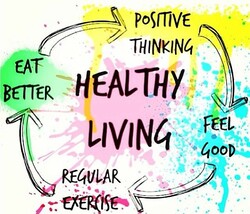March 2023 - Healthy Lifestyle

Last month CLHS students and staff took part in Random Acts of Kindness Week and Pink Shirt Day. Students and staff shared positive gossip about those they feel had been kind in some way. Students brought donations for the foodbank they made cards and painted rocks for people in their lives who have impacted them in a positive way. Some students honored staff members they appreciated by bringing in baked goods. Kindness was celebrated throughout the month of February at CLHS.
This month at Cold Lake High School we are focusing on Healthy Lifestyle. This includes getting enough sleep, healthy eating, and being physically active.
Healthy Living is about taking responsibility for your decisions and making smart health choices for today and for the future. So healthy living would consist of:
- Good Nutrition, Eating Right
- Getting Physically Fit, Beneficial Exercise
- Adequate Rest
- Proper Stress Management
Why is getting enough sleep important?
Getting enough sleep is important for people of all age groups. Sleep contributes to effective functioning of all body systems including the immune system. In teenagers, good quality sleep is especially important for physical health, emotional and mental development, and school performance. During the teenage years, sleep benefits brain development and function, which enhances attention span and improves memory and cognitive abilities. Adequate sleep also supports the physiological growth spurt during the teen years.
Sleep deprivation, on the other hand, leads to drowsiness, lack of attention, and affects academic performance. Inadequate sleep in teenagers has been linked to increased risk of depression and behavioral problems as well as increased risk of developing diabetes and hypertension. It is also shown to have a negative impact on athletic performance.
How do I know if I’m getting enough sleep?
Signs that you need more sleep can include:
- difficulty waking up in the morning,
- trouble concentrating throughout the day,
- falling asleep during classes, and
- feeling moody or even depressed.
How Can I Get a Better Sleep?
A beneficial step is for teens to review and improve their sleep hygiene, which includes their sleep environment and habits. Some healthy sleep tips that can help in this process include:
- Budgeting eight hours of sleep into your daily schedule and keeping that same schedule on both weekdays and weekends.
- Creating a consistent pre-bed routine to help with relaxation and falling asleep fast.
- Avoiding caffeine and energy drinks, especially in the afternoon and evening.
- Putting away electronic devices for at least a half-hour before bed and keeping them on silent mode to avoid checking them during the night.
- Setting up your bed with a supportive mattress that’s the best mattress for you. And don’t forget to bring your best pillow.
- Keeping your bedroom cool, dark, and quiet.
Exercise and Teenagers
Exercise is an important part of keeping teens healthy. Encouraging healthy lifestyles in children and teens is important for when they grow older. Lifestyles that are learned in childhood are more likely to stay with the child into adulthood. Some changes in lifestyle can be harder to make as a person ages. The best way to promote healthy lifestyles is for the whole family to become involved.
A daily exercise program is a fun way to share physical activity with family and friends while helping to establish good heart-healthy habits. The following exercise guidelines for teens can help you and your teen plan activities:
-
Teenagers need at least 60 minutes of moderate to vigorous physical activity on most days to maintain good health and fitness, and for healthy weight during growth. Physical activity should include aerobic, muscle-strengthening, and bone-strengthening exercises.
-
Parents are encouraged to limit a teen's screen time (TV, video game, phone, tablet, and computer) to less than 2 hours daily and replace these sitting activities with activities that require more movement.
Even low-to-moderate intensity activities for as little as 30 minutes a day can be helpful. These activities may include the following:
- Pleasure walking
- Climbing stairs
- Dancing
- Home exercise
Physical Benefits of Exercise:
- Improve the cardiorespiratory system
- Build strong muscles and bones
- Control weight
- Reduce the risk of obesity
- Reduce the risk of heart disease
- Reduce the risk of cancer
- Reduce the risk of type 2 diabetes
- Reduce the risk of high blood pressure
- Reduce the risk of osteoporosis
- Increase life span
Mental Benefits of Exercise:
- Improve mood
- Reduce stress levels
- Reduce depression and anxiety symptoms
- Boost self-esteem
- Enhance body image
- Improve cognitive performance
What is healthy eating?
Eating healthy is an important part of a healthy lifestyle and is something that should be taught at a young age. The following are some general guidelines for helping your teen eat healthy. It’s important to discuss your teen’s diet with their healthcare provider before making any dietary changes or placing your teen on a diet. Discuss these healthy eating recommendations with your teen so they can follow a healthy eating plan:
- Eat 3 meals a day, with healthy snacks in between.
- Increase fiber in the diet.
- Decrease the use of salt.
- Drink water. Try to avoid drinks that are high in sugar, including soda and sports drinks. Fruit juice can have a lot of calories, so limit your teen’s intake. Whole fruit is always a better choice.
- Eat balanced meals.
- When cooking for your teen, try to bake, broil, roast, or grill instead of fry.
- Make sure your teen watches (and decreases, if necessary) their overall sugar intake.
- Choose fruit or vegetables for a snack.
- Decrease the use of butter and heavy gravies.
- Eat more chicken and fish. Limit red meat intake and choose lean cuts when possible.
Healthy Habits
If you are ready to make changes, here are some tried-and-true tips:
- Drink low-fat milk and water instead of sugary drinks.
- Eat at least 5 servings a day of fruits and veggies.
- Include a variety protein in your diet. Protein foods — including lean meat and poultry, seafood, eggs, beans, soy products, and nuts — provide important nutrients and help you feel satisfied.
Choose whole grains (like whole-wheat bread, brown rice, and oatmeal), which provide fiber to help you feel full. - Don’t skip meals, including breakfast.
- Pay attention to portion sizes.
- Prepare most meals at home. Eating out a lot can cause weight gain.
- Be active every day. Walk to school, sign up for a fitness class, find a sport you like, or dance in your bedroom. It doesn't matter what you do — just move!
Check out these video's for more information:
How the food you eat affects your brain
How to help your teen to get better sleep
For more resources, check out the Healthy Lifestyle page of the NLPS website.
If you would like me to connect with your child or your family, you can contact me (Miss MacDonald) at the school at 780-639-0039.
